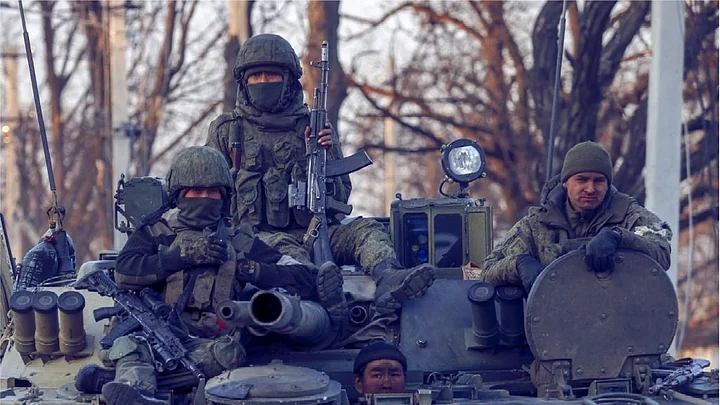"The continuation of the defence of the city would lead to fatal consequences. In order to preserve the lives of Ukrainian defenders, a decision was made to withdraw," read the statement of the Ukrainian military, posted on Facebook over the weekend of 2 and 3 July 2022.
Russian forces claimed on Sunday, 3 July, to have full control over the key city of Lysychansk, which was serving as the last major Ukrainian stronghold in the Luhansk region in the eastern part of the country.
President Vladimir Putin declared victory and reportedly told Russian troops to rest and "increase their combat capabilities."
Ukrainian President Volodymyr Zelenskyy acknowledged the situation in his nightly address, but vowed that Ukraine will not give up.
"We will return thanks to our tactics, thanks to the increase in the supply of modern weapons. Ukraine does not give anything up."
Nevertheless, the hoisting of the Russian flag in Lysychansk might be a turning point of the war. Why is this Russian victory important? Because troops can regroup and focus on another key province – Donetsk.
Donetsk Is Next Because Donbas the Big Prize
Controlling Lysychansk means effectively controlling the Luhansk Oblast, given that the other key city, Severodonetsk, fell to Russian troops a few days ago. With Luhansk under Russian occupation, Donetsk becomes the next target.
But the larger prize is Donbas, a region which Ukraine controlled two-thirds of despite the heavy fighting that has occured between its troops and pro-Russia separatists since 2014, as explained in the subsequent section.
The Kremlin wants to control all of the Donbas, which is a heavily industrialised area bordering Russia comprising of both the Luhansk Oblast and the Donetsk Oblast.
Not only does the overall region have the potential for heavy mining and production of steel capacity, but it also has large coal reserves.
Capturing the Donbas would also allow the Russians to build an overland corridor to Crimea in the Black Sea peninsula, which is now under Moscow's control thanks to the annexation in 2014.
The victory is symbolic as well. The Donbas region has witnessed intense fighting since 2014 when pro-Russian separatists proclaimed Luhansk and Donetsk as independent "people's republics".
And if you remember, just three days before Russia launched its assault on Ukraine, it officially recognised the self-proclaimed People's Republics of Luhansk and Donetsk.
"By this, the Russian government meant all of Donbas", says Andreas Heinemann-Gruder, a political scientist at the University of Bonn, in a Deutsche Welle report.
After conquering all of Donbas, he argues, Russia "could declare a victory at home and possibly declare an end to the war."
Showing a meaningful victory at home is very important to the Kremlin at the moment. The Russian military failed spectacularly in its attempts to control Kyiv, and was even pushed back by Ukrainian troops from Kharkiv.
Putin desperately needs "a win", says Matthew Schmidt, associate professor of National Security and Political Science at the University of New Haven, as reported by The Washington Post.
Recap: Separatism in Donetsk & Luhansk
Russian troops have undoubtedly received support from pro-Russian separatists in the region. After all, a third of the Donbas region has been under their control since 2014.
A month after Crimea's annexation in 2014 and its declaration independence from Ukraine, government buildings and key infrastructure in Donetsk and Luhansk started being seized by pro-Russia separatist groups.
Composed of locals angry with Kyiv and supported militarily by unofficial Russian soldiers, Donetsk and Luhansk declared independence in May 2014.
A referendum was held on 11 May 2014 to declare freedom from Ukraine, after which the self-proclaimed Donetsk People’s Republic and the Luhansk People’s Republic came into being.
The Russian government was accused of supporting the rebels with both troops and military equipment. It has also allegedly supplied Russian passports and COVID-19 vaccines to the people of Donbas.
Ukrainian forces went on the offensive to reclaim the separatist-held territories. The fighting killed thousands and went on till France and Germany intervened.
The peace deals, knowns as Minsk I (September 2014) and Minsk II (February 2015) led to a ceasefire that ended with the separatists having de facto control of around one-third of Donetsk and Luhansk, and Ukrainian troops controlled around two-thirds of the region.
Those deals were thrown out of the window by Vladimir Putin the second Russian troops entered the Donbas to "demilitarise" and "denazify" the region on 24 February 2022.
More than four months later, heavy fighting continues, but the wind is blowing Russia's way.
(With inputs from NYT, DW, and Washington Post.)
